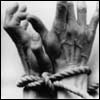I was listening to a radio discussion about bullying. According to the presenter, the data suggests that there is a correlation between being bullied as a child and growing up to be a bully oneself. People were calling in to tell of their experiences of being picked on in the schoolyard, and whether they felt that their early experiences had impacted their later life. It was a fascinating and thought-provoking discussion.
Parenthetically, one guy admitted that he had been a bully as a child. He told a few stories of how he used to terrorize his playmates, and how he’d slowly come to realize how wrong his behavior had been. He sounded justly proud that he no longer felt the desire to persecute innocent victims.
I was actually quite impressed with him, until he shared that in his current job, which he loves, he has absolute power over others. I guess some things never change.
Or do they? Can one truly break away from the evil that others did, and resolve to act with generosity and understanding to others? Are we condemned to blindly repeat our childhood experiences, without hope or recourse for a better future, or can we exercise free choice? How terrifying a prospect that the ordeals of one’s past should determine one’s future behavior towards others. How can a victim ensure not to become a perpetrator?
Breaking Free
The Jews in Egypt were slaves. They were the victims of decades of brutality and lifetimes of indignity. They were defeated and demoralized, and a steady diet of cruelty was their daily lot. Suddenly, Moses and Aaron appeared, bearing the promise of freedom and free will. They were soon to be released from their servitude, and would be able to act in any way they chose. Would they have the emotional strength to move on from the hardships of their past, or would they treat others as they themselves had been treated?
“So the L‑rd spoke to Moses and to Aaron, and He commanded them concerning the children of Israel.”1 The Jerusalem Talmud2 explains that this first commandment the children of Israel received from G‑d was the directive that a Jewish slave is to be freed within six years.
On the face of it, this seems so incongruous. Of all the mitzvahs in the Torah, was this the most important instruction that Moses and Aaron needed to share at this juncture? Surely there were more weighty matters to introduce to their attention. What a time to instruct them about the care and treatment of their servants—when they were still slaves themselves!
The commentators explain that the reason a Jew has no right to enslave his fellow in perpetuity is because G‑d alone is our Master, and we can belong to no one other than Him. Even in the rare circumstances where a man sells his services, submitting himself to the authority of another, that power is temporary and must be exercised with caution.
By introducing this commandment while they were still enslaved, G‑d was showing the Jews a way to break out of the cycle of violence and intimidation that is the usual lot of those who were once misused. Even in the dark times, they were reminded that everything comes from G‑d, and that He is the source of all. By connecting themselves with a higher power, they managed to overcome their bitterness, and substitute kindness for cruelty.
Even those most abused can have the ability to overcome. By connecting oneself to G‑d and surrendering to His mission, one undergoes an exodus from the cruelty of his past, and is given a chance to enjoy his own personal redemption.







Join the Discussion